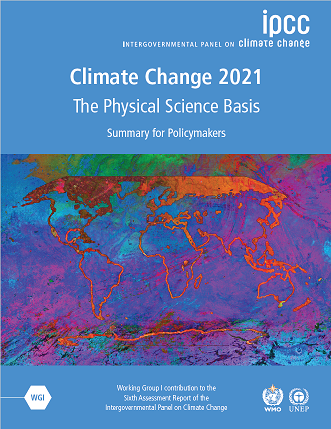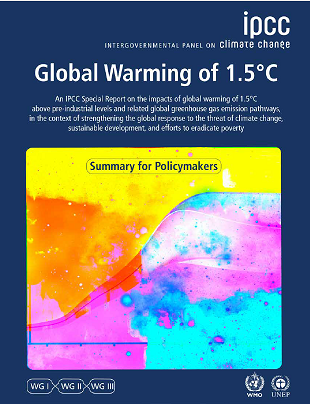
The global carbon budget for 1.5°C runs out in 2030
Atmospheric CO2 is now at a dangerous level
The CO2 released from burning fossil fuels persists in the atmosphere for thousands of years, and so the concentration of CO2 in the atmosphere has been steadily rising for the last 150 years, since large scale burning of fossil fuels commenced.This is causing an increase in the average global temperature (now over 1°C), and more storms, floods, heatwaves and droughts - see document 51 and document 52.
It is now realised that this is causing enormous numbers of deaths and climate refugees and a vast amount of environmental damage, and that there is an increasing risk of positive feedback loops - and that great efforts must therefore be made to limit global warming to 1.5°C.
What is the carbon budget?
As the concentration of CO2 in the atmosphere increases, so does the average global temperature.From the total amount of CO2 emitted by mankind in the past, and the effect that it has had, scientists have estimated the limit to further emissions of CO2 if we are to keep global warming within a particular limit e.g. 1.5°C.
This is known as the CO2 budget, or carbon budget.
By comparing the carbon budget with current annual CO2 emissions, we can calculate how long the budget will last if no changes are made. This indicates the degree of urgency of action.
The IPCC report of 2021
 The AR6 WG1 report [1] was published by the Intergovernmental Panel on Climate Change (IPCC) in August 2021. (The IPCC is the United Nations body for assessing the science relating to climate change.)
The AR6 WG1 report [1] was published by the Intergovernmental Panel on Climate Change (IPCC) in August 2021. (The IPCC is the United Nations body for assessing the science relating to climate change.)The report includes figures for the carbon budget for 1.5°C. The budget calculations had been adjusted slightly since the previous IPCC report of 2018, taking into account the further information available.
The residual global carbon budget to remain within 1.5°C of global warming with 67% probability is given as
400 billion tonnes CO2 from the start of 2020
.With the world population having just passed 8 billion people, this 400 billion tonnes works out as 50 tonnes CO2 per person.
Global CO2 emissions are about 36 billion tonnes per year (document 94), and so the 400 billion tonnes CO2 will last just 11 years if no reductions are made, i.e. the global carbon budget for 1.5°C runs out at the end of 2030.
High emission countries
The Paris Agreement specifies in Article 4.1 that developed countries will have a proportionally higher reduction in emissions as it states "peaking [in greenhouse gas emissions] will take longer for developing countries", and states repeatedly that decisions will be taken according to "the principle of equity" - see document 122. This principle of equity is usually taken to mean that the residual global carbon budget will be divided between nations as an equal share per person.So if a country has CO2 emissions per person that are double the world average, it has to cut emissions twice as quickly as the average. If it cuts emissions only as fast as the average, it would take double its fair share of the carbon budget.
The UK has CO2 emissions of about 9 tonnes per person per year (which is double the world average of 4.5). So the UK's per capita fair share of the carbon budget of 50 tonnes per person runs out in about 6 years from the start of 2020, i.e. during 2025. Read more at document 33.
Most people are either unaware of or in denial about the severity and urgency of the climate emergency - read more at document 50.
Low emission countries
The Paris Agreement allows developing countries to continue to increase CO2 emissions for a period. Considering India as an example, its emissions are currently 1.8 tonnes CO2 per person per year, less than half the world average (see document 94). So India's share of the global CO2 budget of 50 tonnes per person will last about 30 years, and it has considerable leeway in its climate policies.The global CO2 budget for lower levels of confidence in limiting global warming to 1.5°C
The calculations shown above are for being 67% confident of limiting global warming to 1.5°C. If we accept a lower level of certainty of keeping warming within the 1.5°C limit, the IPCC carbon budget is slightly greater - for 50% confidence, it is500 billion tonnes CO2 rather than 400 billion tonnes CO2
. This extra 100 billion tonnes CO2 will last the world an extra 3 years at the current global emission rate. For a high emission country such as the UK, its per capita share will last an extra 1 - 2 years at its current emission rate - until 2027 for the UK.The global CO2 budget for 1.6°C and higher temperatures
For 1.6°C, the IPCC global CO2 budget is150 billion tonnes more than the budget for 1.5°C
. This will last the world an extra 4 years at the current global emission rate. For a high emission country such as the UK, its per capita share will last an extra 2 years at its current emission rate.For higher temperatures, budgets increase in proportion, except that the risk of tipping points increases steadily.
Latest research
Since the 2021 IPCC report, the latest research has indicated that global carbon budgets are even smaller than previously estimated, e.g. see the 2024 Indicators of Global Climate Change report [2].This makes climate action even more urgent.
Points from the UN / IPCC reports
Some key points from the IPCC report of 2021 are:- "Today's report is a code red for humanity" [3]
- "unless there are immediate rapid and large-scale reductions in greenhouse gas emissions, limiting global warming to 1.5°C will be beyond reach" [4]
- "there is no time for delay and no room for excuses" [3]
 The relevant IPCC report prior to the 2021 AR6 WG1 report was the SR15 report [5][6][7], released by the IPCC in 2018. Some key points from this are:
The relevant IPCC report prior to the 2021 AR6 WG1 report was the SR15 report [5][6][7], released by the IPCC in 2018. Some key points from this are:- "limiting global warming to 1.5°C would require rapid and far-reaching transitions in energy, land, urban and infrastructure (including transport and buildings), and industrial systems" [6]
- "These systems transitions are unprecedented in terms of scale, but not necessarily in terms of speed, and imply deep emissions reductions in all sectors" [6]
- "[Global] emissions of CO2 would need to fall by about 45 percent from 2010 levels by 2030, reaching 'net zero' around 2050." [7]
- limiting global warming to 1.5°C rather than 2° would reduce the effects of climate change, for example loss of coral reefs would be virtually complete at 2°, but 10-30% would survive at 1.5° [7].
- "The next few years are probably the most important in our history".
Response by governments
After the 2019 street protests, which were sparked by the 2018 IPCC SR15 report, many national and local administrations declared a Climate Emergency, but most have since failed to implement the "rapid and far reaching transitions" recommended by the IPCC. Some governments, including the UK's, have even encouraged fossil fuel use by measures such as further road building and airport expansion.In 2022, United Nations Secretary-General António Guterres took the extraordinary step of accusing governments of lying about climate action, saying "Some government and business leaders are saying one thing - but doing another. Simply put, they are lying". Read more at document 136.
References
| [1] | IPCC (Aug 2021) AR6 Climate Change 2021: The Physical Science Basis https://www.ipcc.ch/report/ar6/wg1/ |
| [2] | Indicators of Global Climate Change 2024 (2025) https://essd.copernicus.org/articles/17/2641/2025/ |
| [3] | Secretary-General's statement on the IPCC Working Group 1 Report on the Physical Science Basis of the Sixth Assessment (Aug 2021) https://www.un.org/sg/en/content/secretary-generals-statement-the-ipcc-working-group-1-report-the-physical-science-basis-of-the-sixth-assessment |
| [4] | Abdalah Mokssit (Secretary of the IPCC) (Aug 2021) IPCC press conference https://un-spbf.org/event/ipcc-press-release-climate-action-cannot-wait/ |
| [5] | IPCC (Oct 2018) SR15 report press release https://www.ipcc.ch/site/assets/uploads/2018/11/pr_181008_P48_spm_en.pdf |
| [6] | IPCC (Oct 2018) SR15 report headline statements https://www.ipcc.ch/site/assets/uploads/sites/2/2019/06/SR15_Headline-statements.pdf |
| [7] | IPCC (Oct 2018) SR15 Summary for policymakers https://www.ipcc.ch/site/assets/uploads/sites/2/2018/07/SR15_SPM_version_stand_alone_LR.pdf |
First published: Feb 2019

 ✖
✖